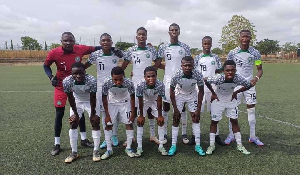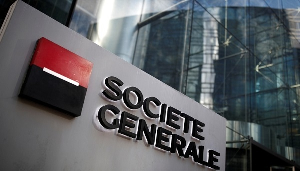- Home - News
- TWI News | TV
- Polls
- Year In Review
- News Archive
- Crime & Punishment
- Politics
- Regional
- Editorial
- Health
- Ghanaians Abroad
- Tabloid
- Africa
- Religion
- Election 2020
- Coronavirus
- News Videos | TV
- Photo Archives
- News Headlines
- Press Release
General News of Monday, 3 February 2003
Source: GNA
Refusal to appear before NRC to attract fine
Refusal to honour invitations to appear before the National Reconciliation Commission (NRC) would attract a fine of 10 million cedis or two years in to jail or both.
Mr Mohammed Affum of the Public Affairs Secretariat of the NRC, said though not a court, the Commission had the powers of a High Court and "refusal to appear tantamount to contempt of a High Court".
He was answering questions at a forum at Korle Gonno in Accra on Sunday, organised by the Office of the National Chief Imam, Ghana Civil Society Coalition and the Centre for Democratic Development (CDD) on the theme, "Towards Achieving Lasting National Reconciliation".
The Forum was the first of five for Moslem communities in Accra and the Muslims Students Union at the University of Ghana Legon, to sensitise them on the work of the Commission.
Mr Affum said persons invited before the Commission are given 10 days and a reminder after which they would be subpoenaed on refusal to honour the invitation.
He said holders of vital documents could also be subpoenaed adding that, the Commission had the power to enter premises for documents needed for its work.
Mr Affum said it was necessary to "re-open the wounds of the past human rights violations, because the wounds were not properly healed".
To a suggestion from Nii Okai Aryee of the Akweteman branch of the Ghana Muslim Mission, that the entire Ghanaian society should feel ashamed for perpetrating human rights violations, Mr Affum said the State had accepted responsibility for the abuses.
He said the Commission was interested in the role of organs like student bodies, chiefs, religious organisations, the Judiciary and the security agencies in the abuses.
Mr Affum said there were human rights violations following coup d'etats and explained that the Commission was to look into the "context within which the violations occurred" and address them, adding that, the NRC had no power to punish perpetrators.
It would rather recommend appropriate reparations for victims, Mr Affum said.
Sheikh Arimiyao Shaibu, Deputy Director of Islamic Education Unit, referred to personalities of reconciliation in the Koran, such as Allah's reconciliatory act to Adam after he felled, Yussif and his brothers who sold him into exile after an unsuccessful attempt to kill him, and Prophet Mohammed forgiveness to his torturers on his return from his flight from Mecca to Madina.
He entreated Muslims to contribute to the success of the reconciliation exercise by identifying victims and encouraging them to file their petitions.
They should also come out to tell the truth when invited.
Alhaji Alhassan Abdulai, Project Co-ordinator, Ghana Civil Society on Reconciliation, who chaired the forum, said the aim of the exercise was to engage the nation in deep reflection.
He said so far the proceedings at the Commissions sittings had gone down well with the people.
Alhaji Abdulai said the exercise was on-going and called on identifiable organisations like religious bodies, youth clubs, labour movements and political groupings to continue the process.
"If we allow the country to be polarised into ethnic, political, religious, opposing groups, the end result will be the endless conflicts that will cost the nation as is happening in DR Congo, Burundi, Liberia, Sierra Leone and our close neighbour, La Cote d'Ivoire.
"I trust Ghanaians and know that by our upbringing and faith in God we shall say, never again shall we allow Ghana to degenerate into chaos. We are one nation with a common destiny. We must show by our behaviour that we believe in each his brother's keeper", Alhaji Abdulai said.










